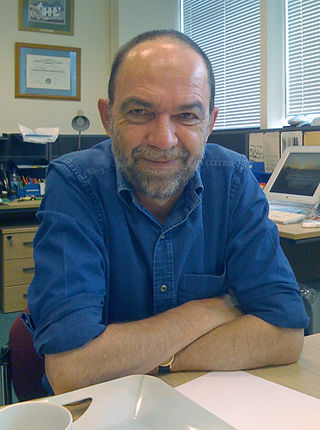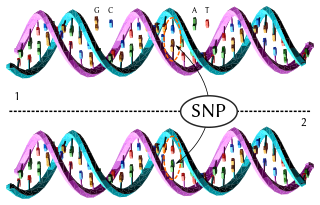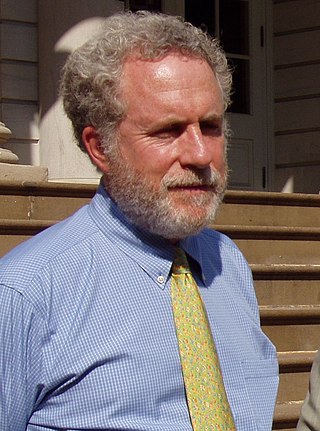An allele is a variation of the same sequence of nucleotides at the same place on a long DNA molecule, as described in leading textbooks on genetics and evolution.
A microsatellite is a tract of repetitive DNA in which certain DNA motifs are repeated, typically 5–50 times. Microsatellites occur at thousands of locations within an organism's genome. They have a higher mutation rate than other areas of DNA leading to high genetic diversity. Microsatellites are often referred to as short tandem repeats (STRs) by forensic geneticists and in genetic genealogy, or as simple sequence repeats (SSRs) by plant geneticists.

DNA profiling is the process of determining an individual's DNA characteristics. DNA analysis intended to identify a species, rather than an individual, is called DNA barcoding.

Sir Alec John Jeffreys, is a British geneticist known for developing techniques for genetic fingerprinting and DNA profiling which are now used worldwide in forensic science to assist police detective work and to resolve paternity and immigration disputes. He is Professor of Genetics at the University of Leicester, and he became an honorary freeman of the City of Leicester on 26 November 1992. In 1994, he was knighted for services to genetics.

Molecular genetics is a sub-field of biology that addresses how differences in the structures or expression of DNA molecules manifests as variation among organisms. Molecular genetics often applies an "investigative approach" to determine the structure and/or function of genes in an organism's genome using genetic screens. The field of study is based on the merging of several sub-fields in biology: classical Mendelian inheritance, cellular biology, molecular biology, biochemistry, and biotechnology. Researchers search for mutations in a gene or induce mutations in a gene to link a gene sequence to a specific phenotype. Molecular genetics is a powerful methodology for linking mutations to genetic conditions that may aid the search for treatments/cures for various genetics diseases.

Human variability, or human variation, is the range of possible values for any characteristic, physical or mental, of human beings.

In genetics, a single-nucleotide polymorphism is a germline substitution of a single nucleotide at a specific position in the genome. Although certain definitions require the substitution to be present in a sufficiently large fraction of the population, many publications do not apply such a frequency threshold.

Peter J. Neufeld is an American lawyer, cofounder, with Barry Scheck, of the Innocence Project, and a founding partner in the civil rights law firm Neufeld Scheck & Brustin. Starting from his earliest years as an attorney representing clients at New York's Legal Aid Society, and teaching trial advocacy at Fordham School of Law from 1988 to 1991, he has focused on civil rights and the intersection of science and criminal justice.

Ranajit Chakraborty was a human and population geneticist. At the time of his death, he was Director of the Center for Computational Genomics at the Institute of Applied Genetics and Professor in the Department of Forensic and Investigative Genetics at the University of North Texas Health Science Center in Fort Worth, Texas. His scientific contributions include studies in human genetics, population genetics, genetic epidemiology, statistical genetics, and forensic genetics.
A DNA database or DNA databank is a database of DNA profiles which can be used in the analysis of genetic diseases, genetic fingerprinting for criminology, or genetic genealogy. DNA databases may be public or private, the largest ones being national DNA databases.

DNAPrint Genomics was a genetics company with a wide range of products related to genetic profiling. They were the first company to introduce forensic and consumer genomics products, which were developed immediately upon the publication of the first complete draft of the human genome in the early 2000s. They researched, developed, and marketed the first ever consumer genomics product, based on "Ancestry Informative Markers" which they used to correctly identify the BioGeographical Ancestry (BGA) of a human based on a sample of their DNA. They also researched, developed and marketed the first ever forensic genomics product - DNAWITNESS - which was used to create a physical profile of donors of crime scene DNA. The company reached a peak of roughly $3M/year revenues but ceased operations in February 2009.
Personal genomics or consumer genetics is the branch of genomics concerned with the sequencing, analysis and interpretation of the genome of an individual. The genotyping stage employs different techniques, including single-nucleotide polymorphism (SNP) analysis chips, or partial or full genome sequencing. Once the genotypes are known, the individual's variations can be compared with the published literature to determine likelihood of trait expression, ancestry inference and disease risk.
BRT Laboratories, Inc. is a Baltimore, Maryland-based biotechnology company that performs DNA testing. The company has three divisions: Relationship Testing, Forensics, and Clinical Services. It is a privately held, wholly owned subsidiary of Baltimore RH Typing Laboratory, Inc.
John M. Butler is a scientist and expert on forensic DNA profiling. He is a fellow at the National Institute of Standards and Technology. Since 2020, he serves as president of the International Society for Forensic Genetics.
The People of the British Isles (PoBI) is an ongoing population genetics project based at the University of Oxford. The project began in 2004 and is ongoing. Professor Sir Walter Bodmer founded and leads the project.
GEDNAP is the acronym for German DNA Profiling and was used in the early nineties in analogy to EDNAP (European DNA Profiling, a working group of the International Society for Forensic Genetics for the first time in the course of the proficiency tests organized by the German Stain Commission, a Joint Commission of University Institutes of Legal Medicine and Police Institutes of Forensic Sciences in Germany.

The International Society for Forensic Genetics – ISFG is an international non-profit scientific society founded in 1968. The main goal of the society is to advance the field of forensic genetics, also termed DNA profiling, through dissemination of scientific results and opinions, communication amongst scientists and education. The bi-annual international ISFG congresses, international workshops and seminars, the society’s scientific journal, and the scientific recommendations on current topics all work towards this goal. The society’s website contains up to date information on all activities.

The Y Chromosome Haplotype Reference Database (YHRD) is an open-access, annotated collection of population samples typed for Y chromosomal sequence variants. Two important objectives are pursued: (1) the generation of reliable frequency estimates for Y-STR haplotypes and Y-SNP haplotypes to be used in the quantitative assessment of matches in forensic and kinship cases and (2) the characterization of male lineages to draw conclusions about the origins and history of human populations. The database is endorsed by the International Society for Forensic Genetics (ISFG). By October 2022 350.500 9-STR locus haplotypes, among them 290.147 17-STR locus haplotypes, 103.631 23-STR locus haplotypes, 106.025 27-STR locus haplotypes and 31.377 Y SNP haplotypes sampled for 141 countries have been directly submitted by forensic institutions and universities. In geographic terms, about 53% of the YHRD samples stem from Asia, 21% from Europe, 12% from North America, 10% from Latin America, 3% from Africa, 0.8% from Oceania/Australia and 0.2% from the Arctic. The 1.403 individual sampling projects are described in more than 780 peer-reviewed publications

DNA phenotyping is the process of predicting an organism's phenotype using only genetic information collected from genotyping or DNA sequencing. This term, also known as molecular photofitting, is primarily used to refer to the prediction of a person's physical appearance and/or biogeographic ancestry for forensic purposes.

DNA profiling is the determination of a DNA profile for legal and investigative purposes. DNA analysis methods have changed numerous times over the years as technology improves and allows for more information to be determined with less starting material. Modern DNA analysis is based on the statistical calculation of the rarity of the produced profile within a population.










